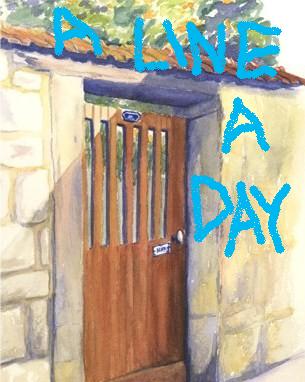The uphill battle to be a decent dad is largely what my debut novel is about. And it's a prominent theme of my second one as well. If you're lucky enough to have a good father, or perhaps like myself are blessed to have a great one, I know he'll appreciate a bit of recognition on the third Sunday of June (or any other day of the year). If you're trying to be the best father you can be, such as I am (photo of me and my little angel appears here), then you know it's hard work and the very best job there is. I did my best to capture the majesty of fatherhood via pictures I found for this post. Pretty sure I found one or two that will make some of you smile.
Everyday is Father's Day 🙏🏿 pic.twitter.com/0Hh6wq4zXs— WS (@wesleysnipes) January 5, 2018
Stuck on what to get your dad for Father's Day? He can always use more pairs of socks, but you can probably do better than that. How about a good book? Patches of Grey, perhaps? Matters of Convenience, maybe. Or go nuts and double up!
 Patches Of Grey by Roy L. Pickering Jr.
Patches Of Grey by Roy L. Pickering Jr.My rating: 5 of 5 stars
"Pickering's style is fluid and crisp. There's a certain clarity to the prose that's considered and well judged - just enough to paint the picture and more than enough to drive along the narrative." - Khome (UnheardWords.com)
Named a 2012 B.R.A.G. Medallion™ Honoree
Synopsis: Tony Johnson is a studious young man planning to soon graduate from much more than high school. Although his zip code places him in a Bronx tenement pre "rise of Obama", his sights are set far beyond the trappings of his humble upbringing. Collegiate dreams and falling in love with a white classmate put him strongly at odds with his father. His brother C.J.'s rebellious ways endanger his life on gang ruled streets and the chastity of their sister Tanya is clearly approaching its demise. But it is Tony who incurs the majority of Lionel Johnson's wrath for the sins of ambition, exhibiting color blind love by daring to be with Janet Mitchell, and refusing to bend to his father's will. Seeing unrealized goals reincarnated in the eyes of his eldest son harshly remind Lionel of what once could have been, and of what went wrong. His own childhood in a segregated southern town established a bitter, prejudiced outlook that is the only legacy he has to pass down to his children. When his job and role as primary breadwinner are lost, Lionel's authority quickly erodes and he drowns his disappointment one drink at a time. This affords Tony, who lacks the seemingly servile patience of his mother, an opportunity to assert independence rather than allowing his fate to be set by chance and circumstance. But throughout the course of Roy Pickering's engrossing debut novel, Tony comes to learn that the world is not as black and white as he and his father's opposing mindsets would suggest.
Available in print at Amazon: http://amzn.to/dAcK4j
And Kindle edition: http://tinyurl.com/ydoamc3
At Mahogany Books: http://bit.ly/fbUVcM
At Independent Author Index: http://indaindex.com/patches-of-grey-...
Or direct from the author, at a discount rate if multiple copies are being purchased for a book club, at http://www.roypickering.net
FaceBook page: http://on.fb.me/eJphth
Top Ten Quotes from Patches of Grey - http://www.quotationsdiary.com/indie-...
Review by RawSistaz Reviewers - http://ow.ly/15Umwx
Review at AlvahsBooks.com by Randall Radic - http://www.alvahsbooks.com/?p=417
Review by five bourough book review - http://fiveboroughbooks.blogspot.com/...
Review by Good Books and Wine - http://bit.ly/eOTF4Y
Review by John Paterson:
Patches of Grey is a story in the tradition of the “coming of age” literature (think SE Hinton, or Catcher in the Rye) in an urban African American setting. Roy Pickering captures the angst of boys becoming men with the added complexity of race permeating events and the environment.
The author does a remarkable job illustrating the internal dialogue and conflict all teenagers face as they struggle for identity, but from the perspective of a young black man. The gift is his ability to translate this conversation to a wider audience, to identify both common ground (girls, fathers, social strata) and also present differences that make one appreciate how race, culture, and familial relationships are perceived differently in different groups: e.g., the conflict between being “all you can be,” and being loyal to the group.
The domestic violence was jarring, as was the relativity. Things weren’t “good” or “bad,” but “better than” or “worse than.” Is having an abusive father/husband (who cares for his family) better than having no father around at all? At least he’s not as bad as . . .
It’s a world in which nothing is taken for granted, and nobody can really afford to be easy going. Seeming cool even carries a certain intense, deliberate and intentional quality. There is love, but very little is given – at home or to others -- freely, generously, or without conditions. It’s a lot of work, with a lot of stress hanging in the general atmosphere.
On the other hand, there is a core element of pride, strength, survival – and dare I say – hope and change to the story. Nobody is a naïve fool, or sucker. They are smart and strong characters who may not have started with a lot of advantages, but can take anything. There is “something” in them that will live on forever no matter what changes.
I agree with others who’ve said this should be on the Junior High/High School reading list. (May have to edit some parts?) I think it could be so meaningful, and even change lives, with young readers at that point.
In reading the book I found myself thinking that I really hope the author has son(s), coaches, mentors, and/or is in big brother program. It would be great for the world.
* * *
In addition to Patches of Grey, Roy Pickering is the author of the novella - Feeding the Squirrels
http://www.synergebooks.com/ebook_fee...
Currently Roy is at work on a second novel, Matters of Convenience, from which an excerpt can be found at his blog: http://lineaday.blogspot.com/2009/04/...
View all my reviews


































